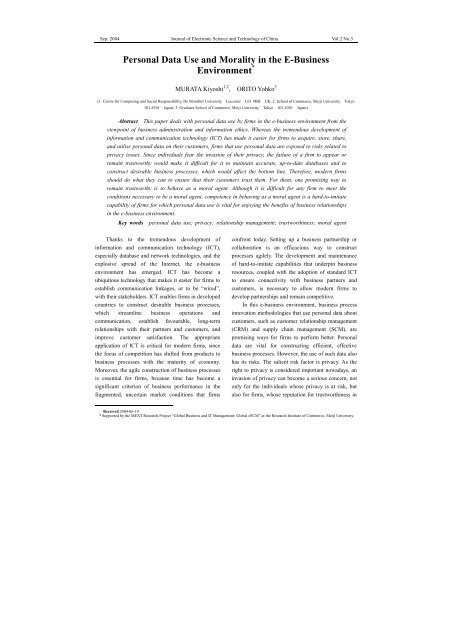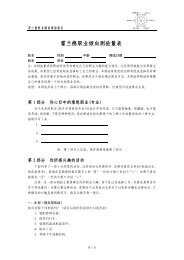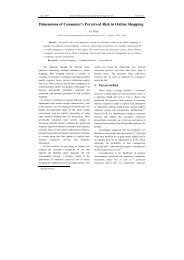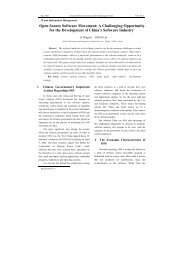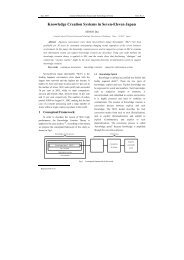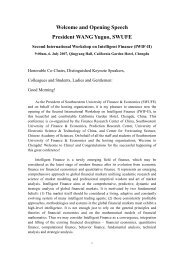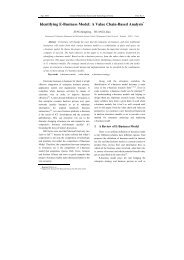Personal Data Use and Morality in the E-Business Environment
Personal Data Use and Morality in the E-Business Environment
Personal Data Use and Morality in the E-Business Environment
Create successful ePaper yourself
Turn your PDF publications into a flip-book with our unique Google optimized e-Paper software.
Sep. 2004 Journal of Electronic Science <strong>and</strong> Technology of Ch<strong>in</strong>a Vol.2 No.3<br />
<strong>Personal</strong> <strong>Data</strong> <strong>Use</strong> <strong>and</strong> <strong>Morality</strong> <strong>in</strong> <strong>the</strong> E-Bus<strong>in</strong>ess<br />
<strong>Environment</strong> *<br />
MURATA Kiyoshi 1,2 , ORITO Yohko 3<br />
(1. Centre for Comput<strong>in</strong>g <strong>and</strong> Social Responsibility, De Montfort University Leicester LE1 9BH UK; 2. School of Commerce, Meiji University Tokyo<br />
101-8301 Japan; 3. Graduate School of Commerce, Meiji University Tokyo 101-8301 Japan)<br />
Abstract This paper deals with personal data use by firms <strong>in</strong> <strong>the</strong> e-bus<strong>in</strong>ess environment from <strong>the</strong><br />
viewpo<strong>in</strong>t of bus<strong>in</strong>ess adm<strong>in</strong>istration <strong>and</strong> <strong>in</strong>formation ethics. Whereas <strong>the</strong> tremendous development of<br />
<strong>in</strong>formation <strong>and</strong> communication technology (ICT) has made it easier for firms to acquire, store, share,<br />
<strong>and</strong> utilise personal data on <strong>the</strong>ir customers, firms that use personal data are exposed to risks related to<br />
privacy issues. S<strong>in</strong>ce <strong>in</strong>dividuals fear <strong>the</strong> <strong>in</strong>vasion of <strong>the</strong>ir privacy, <strong>the</strong> failure of a firm to appear or<br />
rema<strong>in</strong> trustworthy would make it difficult for it to ma<strong>in</strong>ta<strong>in</strong> accurate, up-to-date databases <strong>and</strong> to<br />
construct desirable bus<strong>in</strong>ess processes, which would affect <strong>the</strong> bottom l<strong>in</strong>e. Therefore, modern firms<br />
should do what <strong>the</strong>y can to ensure that <strong>the</strong>ir customers trust <strong>the</strong>m. For <strong>the</strong>m, one promis<strong>in</strong>g way to<br />
rema<strong>in</strong> trustworthy is to behave as a moral agent. Although it is difficult for any firm to meet <strong>the</strong><br />
conditions necessary to be a moral agent, competence <strong>in</strong> behav<strong>in</strong>g as a moral agent is a hard-to-imitate<br />
capability of firms for which personal data use is vital for enjoy<strong>in</strong>g <strong>the</strong> benefits of bus<strong>in</strong>ess relationships<br />
<strong>in</strong> <strong>the</strong> e-bus<strong>in</strong>ess environment.<br />
Key words personal data use; privacy; relationship management; trustworth<strong>in</strong>ess; moral agent<br />
Thanks to <strong>the</strong> tremendous development of<br />
<strong>in</strong>formation <strong>and</strong> communication technology (ICT),<br />
especially database <strong>and</strong> network technologies, <strong>and</strong> <strong>the</strong><br />
explosive spread of <strong>the</strong> Internet, <strong>the</strong> e-bus<strong>in</strong>ess<br />
environment has emerged. ICT has become a<br />
ubiquitous technology that makes it easier for firms to<br />
establish communication l<strong>in</strong>kages, or to be “wired”,<br />
with <strong>the</strong>ir stakeholders. ICT enables firms <strong>in</strong> developed<br />
countries to construct desirable bus<strong>in</strong>ess processes,<br />
which streaml<strong>in</strong>e bus<strong>in</strong>ess operations <strong>and</strong><br />
communication, establish favourable, long-term<br />
relationships with <strong>the</strong>ir partners <strong>and</strong> customers, <strong>and</strong><br />
improve customer satisfaction. The appropriate<br />
application of ICT is critical for modern firms, s<strong>in</strong>ce<br />
<strong>the</strong> focus of competition has shifted from products to<br />
bus<strong>in</strong>ess processes with <strong>the</strong> maturity of economy.<br />
Moreover, <strong>the</strong> agile construction of bus<strong>in</strong>ess processes<br />
is essential for firms, because time has become a<br />
significant criterion of bus<strong>in</strong>ess performance <strong>in</strong> <strong>the</strong><br />
fragmented, uncerta<strong>in</strong> market conditions that firms<br />
confront today. Sett<strong>in</strong>g up a bus<strong>in</strong>ess partnership or<br />
collaboration is an efficacious way to construct<br />
processes agilely. The development <strong>and</strong> ma<strong>in</strong>tenance<br />
of hard-to-imitate capabilities that underp<strong>in</strong> bus<strong>in</strong>ess<br />
resources, coupled with <strong>the</strong> adoption of st<strong>and</strong>ard ICT<br />
to ensure connectivity with bus<strong>in</strong>ess partners <strong>and</strong><br />
customers, is necessary to allow modern firms to<br />
develop partnerships <strong>and</strong> rema<strong>in</strong> competitive.<br />
In this e-bus<strong>in</strong>ess environment, bus<strong>in</strong>ess process<br />
<strong>in</strong>novation methodologies that use personal data about<br />
customers, such as customer relationship management<br />
(CRM) <strong>and</strong> supply cha<strong>in</strong> management (SCM), are<br />
promis<strong>in</strong>g ways for firms to perform better. <strong>Personal</strong><br />
data are vital for construct<strong>in</strong>g efficient, effective<br />
bus<strong>in</strong>ess processes. However, <strong>the</strong> use of such data also<br />
has its risks. The salient risk factor is privacy. As <strong>the</strong><br />
right to privacy is considered important nowadays, an<br />
<strong>in</strong>vasion of privacy can become a serious concern, not<br />
only for <strong>the</strong> <strong>in</strong>dividuals whose privacy is at risk, but<br />
also for firms, whose reputation for trustworth<strong>in</strong>ess <strong>in</strong><br />
Received 2004-06-19<br />
* Supported by <strong>the</strong> MEXT Research Project “Global Bus<strong>in</strong>ess <strong>and</strong> IT Management: Global eSCM” at <strong>the</strong> Research Institute of Commerce, Meiji University.
No.3 MURATA Kiyoshi et al: <strong>Personal</strong> <strong>Data</strong> <strong>Use</strong> <strong>and</strong> <strong>Morality</strong> <strong>in</strong> <strong>the</strong> E-Bus<strong>in</strong>ess <strong>Environment</strong> 117<br />
<strong>the</strong> e-bus<strong>in</strong>ess environment can be jeopardized.<br />
This paper deals with personal data use by firms<br />
<strong>in</strong> <strong>the</strong> e-bus<strong>in</strong>ess environment from <strong>the</strong> viewpo<strong>in</strong>t of<br />
bus<strong>in</strong>ess adm<strong>in</strong>istration <strong>and</strong> <strong>in</strong>formation ethics. In our<br />
discussion, we emphasise that ethical behaviour,<br />
<strong>in</strong>clud<strong>in</strong>g <strong>the</strong> protection of privacy, has practical or<br />
strategic value, as well as ethical or human value, for<br />
modern firms.<br />
1 <strong>Personal</strong> <strong>Data</strong> <strong>Use</strong> <strong>and</strong> Privacy<br />
1.1 Relationship Management <strong>and</strong> Privacy Risk<br />
In bus<strong>in</strong>ess, personal data use first became<br />
important <strong>in</strong> market<strong>in</strong>g. Instead of mass market<strong>in</strong>g,<br />
which aims at maximis<strong>in</strong>g market share, personal<br />
market<strong>in</strong>g held <strong>the</strong> spotlight as <strong>the</strong> market fragmented<br />
<strong>and</strong> uncerta<strong>in</strong>ty <strong>in</strong>creased. The development of<br />
database technology <strong>and</strong> <strong>the</strong> vast growth of comput<strong>in</strong>g<br />
power has made it possible for many firms to<br />
undertake personal market<strong>in</strong>g, which aims to maximise<br />
<strong>the</strong> lifetime value of each customer or customer share<br />
by us<strong>in</strong>g stored data to differentiate customers <strong>and</strong> to<br />
enhance <strong>the</strong>ir loyalty to <strong>the</strong> firm [1,2] .<br />
The ultimate goal of personal market<strong>in</strong>g is<br />
relationship management, that is, to establish<br />
favourable, long-term relationships with <strong>in</strong>dividual<br />
customers by provid<strong>in</strong>g <strong>the</strong>m with useful <strong>in</strong>formation<br />
produced by analys<strong>in</strong>g <strong>the</strong>ir consumption profile. The<br />
idea of relationship management has been extended to<br />
o<strong>the</strong>r bus<strong>in</strong>ess regions. For example, one of <strong>the</strong> ma<strong>in</strong><br />
objectives of SCM <strong>and</strong> CRM is to optimise <strong>the</strong><br />
relationship of a firm with its bus<strong>in</strong>ess partners <strong>and</strong><br />
customers. A firm <strong>and</strong> its bus<strong>in</strong>ess partners that jo<strong>in</strong>tly<br />
<strong>in</strong>troduce SCM systems would enjoy <strong>the</strong> benefits of<br />
efficient, effective merch<strong>and</strong>is<strong>in</strong>g <strong>and</strong> logistics,<br />
realised by <strong>the</strong> precise analysis of shared data on<br />
<strong>in</strong>dividual customers. Conversely, <strong>in</strong>dividual<br />
customers would benefit from <strong>the</strong> timely provision of<br />
goods <strong>and</strong> services that <strong>the</strong>y need from <strong>the</strong> firms, at<br />
lower prices. Needless to say, <strong>the</strong> development <strong>and</strong><br />
ma<strong>in</strong>tenance of accurate databases that store large<br />
amounts of correct personal data are essential to<br />
successful relationship management.<br />
In order to keep databases accurate, it is necessary<br />
for firms to acquire correct, up-to-date data on a<br />
cont<strong>in</strong>uous basis. These data are acquired ma<strong>in</strong>ly by<br />
obta<strong>in</strong><strong>in</strong>g consumption data on <strong>in</strong>dividuals, sometimes<br />
with <strong>the</strong>ir attribute data, through loyalty programmes,<br />
which are called po<strong>in</strong>t card schemes <strong>in</strong> Japan, <strong>the</strong><br />
utilisation of <strong>in</strong>formation systems, such as <strong>the</strong> POS<br />
system, <strong>and</strong> so on. The <strong>in</strong>tegration of data on one<br />
person from various databases, some of which may be<br />
purchased from third party organisations, is usually<br />
useful for determ<strong>in</strong><strong>in</strong>g his or her consumption profile<br />
<strong>and</strong>, <strong>the</strong>refore, may be helpful <strong>in</strong> effective relationship<br />
management. Integrated <strong>and</strong> analysed data on<br />
<strong>in</strong>dividual customers are shared among bus<strong>in</strong>ess<br />
partners to optimise <strong>the</strong> activities of <strong>the</strong> collaborative<br />
body that <strong>the</strong>y form.<br />
However, <strong>the</strong>se methods of collect<strong>in</strong>g <strong>and</strong> us<strong>in</strong>g<br />
personal data entail serious concerns related to <strong>the</strong><br />
<strong>in</strong>vasions of privacy of <strong>in</strong>dividual customers. Kotler<br />
believes that ignorance of ethical problems, such as<br />
privacy, might reduce <strong>the</strong> effectiveness of market<strong>in</strong>g<br />
because consumers will develop a distrust of market<strong>in</strong>g,<br />
<strong>and</strong> <strong>the</strong>n dem<strong>and</strong> <strong>the</strong> regulation of market<strong>in</strong>g<br />
activities [3] . This is also true for relationship<br />
management. In addition to <strong>the</strong> risk of regulation,<br />
consumer distrust <strong>in</strong> <strong>the</strong> market<strong>in</strong>g <strong>and</strong> o<strong>the</strong>r bus<strong>in</strong>ess<br />
activities of a firm may result <strong>in</strong> customers’ refus<strong>in</strong>g to<br />
provide personal data to <strong>the</strong> firm <strong>and</strong> may affect how<br />
much stakeholders trust <strong>the</strong> firm. Without personal<br />
data use <strong>and</strong> trust, a firm cannot survive <strong>in</strong> <strong>the</strong><br />
e-bus<strong>in</strong>ess environment, because it is difficult for <strong>the</strong><br />
firm to construct efficient, effective bus<strong>in</strong>ess processes<br />
<strong>and</strong> to become a partner with o<strong>the</strong>r firms.<br />
Consequently, <strong>the</strong> protection of privacy has a practical<br />
or strategic value for modern firms <strong>in</strong> <strong>the</strong> e-bus<strong>in</strong>ess<br />
environment.<br />
1.2 Privacy as a Matter of Bus<strong>in</strong>ess<br />
The right to privacy is not a very old concept. In<br />
1890, Warren <strong>and</strong> Br<strong>and</strong>eis def<strong>in</strong>ed it as “<strong>the</strong> right to<br />
be let alone” [4] . This “classic” def<strong>in</strong>ition was due to <strong>the</strong><br />
rampant journalism of that time, which featured gossip<br />
items. The advent of <strong>the</strong> <strong>in</strong>formation society has<br />
changed <strong>the</strong> <strong>in</strong>terpretation of <strong>the</strong> right to privacy from<br />
<strong>the</strong> classic one to “<strong>the</strong> <strong>in</strong>dividual’s right to control <strong>the</strong><br />
circulation of <strong>in</strong>formation concern<strong>in</strong>g him or her” [5] .<br />
It is alleged that with <strong>the</strong> maturation of society,
118<br />
people <strong>in</strong> developed countries are aware of <strong>the</strong>ir rights<br />
<strong>and</strong> <strong>the</strong> right to privacy is now universally accepted. In<br />
fact, any bus<strong>in</strong>ess behaviour that arouses suspicion of a<br />
violation of <strong>the</strong> right to privacy may result <strong>in</strong> wi<strong>the</strong>r<strong>in</strong>g<br />
criticism of <strong>the</strong> firm, not only from privacy advocates,<br />
but also from <strong>the</strong> mass media <strong>and</strong> public. The fuss over<br />
“Lotus Market Place: Household” <strong>in</strong> 1990 clearly<br />
showed that privacy was a matter of bus<strong>in</strong>ess [6] . In<br />
2003, Benetton <strong>and</strong> Wal-Mart ab<strong>and</strong>oned <strong>the</strong>ir plans to<br />
deploy radio frequency identification (RFID) to<br />
manage commodities because of <strong>the</strong> <strong>in</strong>tense opposition<br />
to it. It was <strong>the</strong> fear of a violation of <strong>the</strong> right to<br />
privacy that was implicit <strong>in</strong> utilisation of RFID that<br />
triggered opposition to it.<br />
However, <strong>the</strong> right to privacy is an elusive<br />
concept. Several languages, <strong>in</strong>clud<strong>in</strong>g Japanese, lack a<br />
word correspond<strong>in</strong>g to privacy exactly. Enforcement of<br />
this right often appears arbitrary; eventually, <strong>the</strong> right<br />
to privacy will be understood as a subjective,<br />
timeserv<strong>in</strong>g concept. Ironically, whereas loyalty<br />
programmes have rarely been harshly criticised as<br />
threats to <strong>the</strong> right to privacy, RFID is frequently<br />
treated as a serious <strong>in</strong>fr<strong>in</strong>gement upon privacy. Often,<br />
<strong>the</strong> same sales promotion <strong>in</strong>formation provided by a<br />
firm causes diametrically opposite responses from<br />
those who receive it: some welcome <strong>the</strong> provision of<br />
<strong>in</strong>formation because <strong>the</strong>y f<strong>in</strong>d it useful; o<strong>the</strong>rs claim<br />
that <strong>the</strong> provision of “junk” <strong>in</strong>formation <strong>in</strong>fr<strong>in</strong>ges <strong>the</strong>ir<br />
right to privacy. Moreover, <strong>the</strong> present e-bus<strong>in</strong>ess<br />
environment, where massive amounts of personal data,<br />
<strong>in</strong>clud<strong>in</strong>g personal identifiable <strong>in</strong>formation (PII), are<br />
already stored <strong>in</strong> bus<strong>in</strong>ess databases <strong>and</strong> circulated<br />
among firms, makes <strong>the</strong> practical efficacy of <strong>the</strong><br />
def<strong>in</strong>ition of <strong>the</strong> right to privacy as <strong>the</strong> right to control<br />
personal <strong>in</strong>formation dubious.<br />
The elusiveness of <strong>the</strong> right to privacy suggests<br />
that proper h<strong>and</strong>l<strong>in</strong>g of this bus<strong>in</strong>ess matter, as well as<br />
predict<strong>in</strong>g <strong>and</strong> controll<strong>in</strong>g emergence of <strong>the</strong> privacy<br />
problem, is never easy for any firm. Although<br />
legislation has made great efforts to protect <strong>the</strong> privacy<br />
of <strong>in</strong>dividual consumers, <strong>in</strong> step with <strong>the</strong> development<br />
of <strong>the</strong> <strong>in</strong>formation society, mere compliance with <strong>the</strong><br />
regulations, which is sufficient to avoid accusations<br />
<strong>and</strong> <strong>in</strong>demnity risk, is <strong>in</strong>sufficient if firms are to h<strong>and</strong>le<br />
Journal of Electronic Science <strong>and</strong> Technology of Ch<strong>in</strong>a Vol.2<br />
privacy problems properly. For example, <strong>in</strong> July 2001,<br />
Ma<strong>in</strong>ichi Newspapers reported that Toppan Insatsu<br />
sold a mail<strong>in</strong>g list made <strong>and</strong> held by a bankrupt<br />
catalogue shipper, to which Toppan attached a security<br />
warranty, to ano<strong>the</strong>r catalogue shipper. This sale might<br />
be legal, but was questionable <strong>in</strong> <strong>the</strong> light of <strong>the</strong><br />
protection of privacy <strong>and</strong> fraught with risks related to<br />
trust <strong>and</strong> reputation.<br />
2 Firms as Moral Agents<br />
2.1 Cooperation between Firms <strong>and</strong> Individual<br />
Customers: A Game Analysis<br />
Effective personal data use at firms is dependent<br />
on <strong>the</strong> quality of data that <strong>the</strong>y acquire, store, <strong>and</strong> share<br />
with <strong>the</strong>ir bus<strong>in</strong>ess partners. Firms need accurate data<br />
on many <strong>in</strong>dividual customers or consumers to conduct<br />
e-bus<strong>in</strong>ess successfully. However, <strong>in</strong>dividual<br />
customers who hate to have <strong>the</strong>ir right to privacy<br />
<strong>in</strong>fr<strong>in</strong>ged can provide firms with false data without<br />
penalty <strong>and</strong> sometimes even with no qualms. Can firms<br />
motivate <strong>in</strong>dividual customers to stop short of<br />
behav<strong>in</strong>g dishonestly <strong>and</strong> prompt <strong>the</strong>m to provide true<br />
data? Moreover, is <strong>the</strong>re an <strong>in</strong>centive for firms to<br />
ma<strong>in</strong>ta<strong>in</strong> a favourable relationship with <strong>the</strong>ir<br />
customers?<br />
Customer<br />
Dishonest<br />
(Provide <strong>in</strong>correct data)<br />
Honest<br />
(Provide correct data)<br />
Tab.1 Prisoner’s dilemma<br />
Dishonest<br />
(<strong>Use</strong> data <strong>in</strong> an<br />
improper way)<br />
Firm<br />
Honest<br />
(<strong>Use</strong> data <strong>in</strong> a<br />
proper way)<br />
4, 4 10, 2<br />
2, 10 8, 8<br />
To answer <strong>the</strong>se questions, let us consider <strong>the</strong><br />
situation represented <strong>in</strong> <strong>the</strong> well-known game shown <strong>in</strong><br />
Tab.1. In Prisoner’s Dilemma, <strong>the</strong>re are two players, an<br />
<strong>in</strong>dividual customer <strong>and</strong> a firm, <strong>and</strong> each has two<br />
strategies: honest <strong>and</strong> dishonest. For <strong>the</strong> consumer<br />
(dis)honest means provid<strong>in</strong>g <strong>the</strong> firm with (<strong>in</strong>)correct<br />
personal data, while for <strong>the</strong> firm (dis)honest means<br />
us<strong>in</strong>g data acquired from <strong>the</strong> customer <strong>in</strong> a(n)<br />
(im)proper way.<br />
The value of <strong>the</strong> payoff assigned to each outcome
No.3 MURATA Kiyoshi et al: <strong>Personal</strong> <strong>Data</strong> <strong>Use</strong> <strong>and</strong> <strong>Morality</strong> <strong>in</strong> <strong>the</strong> E-Bus<strong>in</strong>ess <strong>Environment</strong> 119<br />
of <strong>the</strong> game is expla<strong>in</strong>ed as follows:<br />
1) When both players choose to be honest, <strong>the</strong><br />
consumer enjoys a high-level payoff by gett<strong>in</strong>g<br />
desirable service provided by <strong>the</strong> firm, which is made<br />
possible by <strong>the</strong> firm’s personal data use, <strong>and</strong> <strong>the</strong> firm<br />
ga<strong>in</strong>s a high-level payoff through its enhanced<br />
efficiency brought about by personal data use.<br />
2) When both players choose to be dishonest, <strong>the</strong>y<br />
ga<strong>in</strong> only a low-level payoff, s<strong>in</strong>ce <strong>the</strong> firm cannot act<br />
effectively to improve <strong>the</strong> status of <strong>the</strong> players as a<br />
consequence of <strong>the</strong> firm’s personal data use.<br />
3) When <strong>the</strong> customer chooses to be dishonest <strong>and</strong><br />
<strong>the</strong> firm is honest, <strong>the</strong> customer gets an outst<strong>and</strong><strong>in</strong>g<br />
payoff, because she receives additional benefit from<br />
<strong>the</strong> firm <strong>in</strong> return for provid<strong>in</strong>g personal data <strong>and</strong> is not<br />
irritated by an <strong>in</strong>vasion of privacy. Conversely, <strong>the</strong> firm<br />
ga<strong>in</strong>s a miserable payoff, s<strong>in</strong>ce it is forced to spend<br />
money acquir<strong>in</strong>g, stor<strong>in</strong>g, <strong>and</strong> utilis<strong>in</strong>g <strong>the</strong> <strong>in</strong>correct<br />
personal data.<br />
4) When <strong>the</strong> customer chooses to be honest <strong>and</strong><br />
<strong>the</strong> firm is dishonest, <strong>the</strong> customer is compelled to bear<br />
a miserable payoff. She is not provided with any<br />
worthwhile personal service, but is exploited by <strong>the</strong><br />
firm. By contrast, <strong>the</strong> firm’s arbitrary utilisation <strong>and</strong><br />
sell<strong>in</strong>g of <strong>the</strong> personal data br<strong>in</strong>gs an outst<strong>and</strong><strong>in</strong>g<br />
payoff to <strong>the</strong> firm.<br />
Obviously, both of <strong>the</strong> rational players ga<strong>in</strong> only<br />
<strong>the</strong> low-level payoff, as a Nash equilibrium, if <strong>the</strong><br />
game is played just once. Tab.2 is <strong>the</strong> payoff matrix of<br />
<strong>the</strong> game when it is repeated <strong>in</strong>f<strong>in</strong>itely under<br />
conditions of perfect monitor<strong>in</strong>g [7,8] . This condition<br />
means that one player can observe <strong>the</strong> o<strong>the</strong>r player’s<br />
play each time <strong>the</strong> game is played. “Inf<strong>in</strong>itely<br />
repeated” means that nei<strong>the</strong>r player knows when <strong>the</strong><br />
game will end. Here, δ is a discount rate, <strong>and</strong> <strong>the</strong><br />
Customer<br />
present value of <strong>the</strong> long-term payoff (multiplied by<br />
1−δ for convenience) is shown <strong>in</strong> Tab.2. In this<br />
<strong>in</strong>f<strong>in</strong>itely repeated game, four strategies are considered.<br />
A player chooses to be (dis)honest at each move of <strong>the</strong><br />
game on adopt<strong>in</strong>g <strong>the</strong> strategy (dis)honest at any time.<br />
Trigger is a strategy such that <strong>the</strong> player cont<strong>in</strong>ues to<br />
choose honest at each move, unless <strong>the</strong> opponent<br />
chooses dishonest; once <strong>the</strong> opponent chooses<br />
dishonest, <strong>the</strong> player cont<strong>in</strong>ues to choose dishonest<br />
from <strong>the</strong>n on. Tit-for-tat is ano<strong>the</strong>r strategy, such that a<br />
player chooses honest on <strong>the</strong> first move <strong>and</strong> makes <strong>the</strong><br />
same choice as <strong>the</strong> opponent’s previous choice from<br />
<strong>the</strong> second move onward.<br />
One Nash equilibrium <strong>in</strong> <strong>the</strong> game is [Dishonest<br />
Anytime, Dishonest Anytime]. However, strategic<br />
profiles [Trigger, Trigger] <strong>and</strong> [Tit-for-Tat, Tit-for-Tat]<br />
become Nash equilibria if δ > 1/3. This means that if<br />
<strong>the</strong> future value of a payoff is sufficiently large<br />
compared with <strong>the</strong> present value, <strong>the</strong> players can<br />
choose cooperative strategies. The implications of <strong>the</strong><br />
result of <strong>the</strong> game for e-bus<strong>in</strong>ess, under <strong>the</strong> condition<br />
of perfect monitor<strong>in</strong>g, are:<br />
1) If an <strong>in</strong>dividual customer believes that it is<br />
beneficial to conduct long-term bus<strong>in</strong>ess transactions<br />
with a firm, she has an <strong>in</strong>centive to cooperate with <strong>the</strong><br />
firm,<br />
2) If a firm believes that long-term transactions<br />
with an <strong>in</strong>dividual customer are more profitable than<br />
short-term or one-time exploitative deals, <strong>the</strong> firm has<br />
an <strong>in</strong>centive to behave cooperatively, <strong>and</strong><br />
3) If both of <strong>the</strong> players believe that <strong>the</strong> opponent<br />
favours <strong>the</strong> larger benefit of long-term transactions<br />
versus short-term transactions, <strong>the</strong>y are strongly<br />
motivated to act cooperatively.<br />
Tab.2 Payoff matrix of <strong>in</strong>f<strong>in</strong>itely repeated prisoner’s dilemma (multiplied by 1−δ)<br />
Firm<br />
Dishonest Anytime Honest Anytime Trigger Tit for Tat<br />
Dishonest Anytime 4,4 10,2 10−6δ, 2+2δ 10−6δ, 2+2δ<br />
Honest Anytime 2,10 8,8 8,8 8,8<br />
Trigger 2+2δ, 10−6δ 8,8 8,8 8,8<br />
Tit for Tat 2+2δ, 10−6δ 8,8 8,8 8,8
120<br />
In this game analysis, <strong>the</strong> assumption that <strong>the</strong><br />
game is repeated <strong>in</strong>f<strong>in</strong>itely is acceptable because it<br />
corresponds to <strong>the</strong> go<strong>in</strong>g concern assumption. In reality,<br />
<strong>the</strong> condition of perfect monitor<strong>in</strong>g may seem too<br />
strong. Indeed, it can never be true <strong>in</strong> <strong>the</strong> real world.<br />
However, <strong>the</strong> shift <strong>in</strong> <strong>the</strong> social expectation of bus<strong>in</strong>ess<br />
behaviour from amoral to moral has enhanced social<br />
sensitivity to immoral behaviour by firms. In addition,<br />
<strong>in</strong> <strong>the</strong> age of <strong>the</strong> control revolution [9] , <strong>the</strong> capacity of<br />
<strong>in</strong>dividuals to control <strong>in</strong>formation has been<br />
significantly improved by ICT, especially <strong>the</strong> Internet<br />
<strong>and</strong> mobile phones. These circumstances place modern<br />
firms under <strong>the</strong> surveillance of “little bro<strong>the</strong>rs” or <strong>the</strong><br />
voluntarily participative Panopticon [10] . Actually, many<br />
bus<strong>in</strong>ess sc<strong>and</strong>als were found out by exposure from<br />
with<strong>in</strong> <strong>and</strong> without recently. In <strong>the</strong> meantime, for firms<br />
<strong>in</strong> <strong>the</strong> e-bus<strong>in</strong>ess environment, <strong>the</strong> importance of<br />
ensur<strong>in</strong>g <strong>the</strong> accuracy of <strong>the</strong> personal data that <strong>the</strong>y<br />
store <strong>and</strong> use is significant, as we have already<br />
mentioned. This means that firms won’t hesitate to<br />
spend substantial amounts to keep <strong>the</strong>ir databases<br />
accurate. Therefore, it is not improper to assume <strong>the</strong><br />
condition of perfect monitor<strong>in</strong>g <strong>in</strong> our analysis,<br />
although it is still possible that <strong>the</strong> monitor<strong>in</strong>g is<br />
distorted because of cognitive biases.<br />
S<strong>in</strong>ce many researchers <strong>and</strong> practitioners assert<br />
<strong>the</strong> f<strong>in</strong>ancial significance of repeat bus<strong>in</strong>ess based on a<br />
long-term relationship with customers for firms <strong>in</strong> <strong>the</strong><br />
e-bus<strong>in</strong>ess environment [11] , <strong>the</strong> profitability of <strong>the</strong><br />
long-term transaction is quite conv<strong>in</strong>c<strong>in</strong>g for <strong>the</strong> firms.<br />
Therefore, a firm <strong>in</strong> <strong>the</strong> e-bus<strong>in</strong>ess environment is<br />
likely to have <strong>the</strong> <strong>in</strong>centive to use personal data<br />
properly <strong>and</strong> to let <strong>in</strong>dividual customers believe that<br />
<strong>the</strong> long-term transaction with <strong>the</strong> firm also benefits<br />
<strong>the</strong>m. By contrast, <strong>in</strong>dividual customers can easily see<br />
<strong>the</strong> benefits of <strong>the</strong> timely provision of customised<br />
goods <strong>and</strong> services at lower prices enabled by <strong>the</strong><br />
proper use of personal data on customers by firms. A<br />
major stumbl<strong>in</strong>g block to customers’ decisions to give<br />
a firm <strong>the</strong>ir personal data on a cont<strong>in</strong>uous basis is <strong>the</strong><br />
uncerta<strong>in</strong> trustworth<strong>in</strong>ess of <strong>the</strong> firm or <strong>the</strong> fear that <strong>the</strong><br />
firm will <strong>in</strong>fr<strong>in</strong>ge on <strong>the</strong>ir right to privacy. Mick et al.<br />
states that firms that use personal data on customers<br />
should not be harmful entities but be partners of <strong>the</strong>ir<br />
Journal of Electronic Science <strong>and</strong> Technology of Ch<strong>in</strong>a Vol.2<br />
customers [12] . Then, under what conditions do<br />
<strong>in</strong>dividual customers have <strong>in</strong>centive to trust a firm?<br />
2.2 <strong>Morality</strong> as a Hard-to-Imitate Capability<br />
There is no quick or special remedy by which<br />
firms can ensure that <strong>in</strong>dividual customers trust <strong>the</strong>m.<br />
Trustworth<strong>in</strong>ess is generated by appropriate words <strong>and</strong><br />
deeds over a long period, but is easily lost by one-time<br />
misconduct, <strong>and</strong> <strong>the</strong> recovery of trustworth<strong>in</strong>ess takes<br />
a long time. The stakeholders <strong>and</strong> <strong>in</strong>fluencers judge<br />
what is appropriate, not <strong>the</strong> firm. The trustworth<strong>in</strong>ess<br />
reflects <strong>the</strong>ir trust <strong>in</strong> <strong>the</strong> firm, which exists with<strong>in</strong> <strong>the</strong>ir<br />
m<strong>in</strong>ds. Therefore, it is difficult for any firm to control<br />
its trustworth<strong>in</strong>ess <strong>and</strong> reputation or <strong>in</strong>formation on <strong>the</strong><br />
trustworth<strong>in</strong>ess.<br />
For a firm, <strong>the</strong> best way to establish <strong>and</strong> ma<strong>in</strong>ta<strong>in</strong><br />
high trustworth<strong>in</strong>ess is to behave as a moral agent.<br />
Necessary conditions for a firm to be a moral agent are:<br />
1) To be sensitive to ethical problems that its behaviour<br />
may cause, 2) To behave defensively, that is, to be<br />
accountable for all its bus<strong>in</strong>ess behaviour, <strong>and</strong> 3) To be<br />
a rational <strong>in</strong>terlocutor, that is, not to hesitate, when<br />
problems with its behaviour are perceived, to discuss<br />
problems with o<strong>the</strong>rs who hold different values from<br />
<strong>the</strong> firm rationally, <strong>and</strong> to commit to problem-solv<strong>in</strong>g<br />
<strong>in</strong> a serious, positive manner.<br />
Needless to say, a firm doesn’t have a personality.<br />
To fulfil <strong>the</strong> necessary conditions, <strong>in</strong>dividual members<br />
of a firm have to behave autonomously as moral agents<br />
<strong>and</strong> share <strong>the</strong> organisational values. Organisational<br />
measures, such as sett<strong>in</strong>g up an ethics steer<strong>in</strong>g<br />
committee, devis<strong>in</strong>g a privacy policy <strong>and</strong> a code of<br />
ethics <strong>and</strong> conduct, educat<strong>in</strong>g <strong>the</strong> employees on ethics,<br />
<strong>and</strong> carry<strong>in</strong>g out an ethical audit of <strong>the</strong> <strong>in</strong>formation<br />
system, may help to make members of a firm behave<br />
morally <strong>and</strong> to give <strong>the</strong> firm a good reputation as a<br />
moral agent [13] .<br />
Unfortunately, it is not easy for a firm to make its<br />
stakeholders <strong>and</strong> <strong>in</strong>fluencers perceive it as a moral<br />
agent. This means that <strong>the</strong> established reputation of a<br />
firm as a moral agent is a rare resource that will allow<br />
it survive competition <strong>in</strong> <strong>the</strong> e-bus<strong>in</strong>ess environment<br />
<strong>and</strong> <strong>the</strong> morality of a firm is a hard-to-imitate<br />
capability. Such a reputation will prompt <strong>in</strong>dividual<br />
customers to trust <strong>the</strong> firm, which should make it easy
No.3 MURATA Kiyoshi et al: <strong>Personal</strong> <strong>Data</strong> <strong>Use</strong> <strong>and</strong> <strong>Morality</strong> <strong>in</strong> <strong>the</strong> E-Bus<strong>in</strong>ess <strong>Environment</strong> 121<br />
for <strong>the</strong> firm to acquire <strong>and</strong> use accurate personal data<br />
on its customers cont<strong>in</strong>uously <strong>and</strong> establish long-term<br />
relationships with its customers <strong>and</strong> bus<strong>in</strong>ess partners.<br />
Individual customers who trust <strong>the</strong> firm may agree to<br />
transfer a range of control over <strong>in</strong>formation concern<strong>in</strong>g<br />
<strong>the</strong>m to <strong>the</strong> firm <strong>and</strong> become bus<strong>in</strong>ess partners or<br />
active components of <strong>the</strong> bus<strong>in</strong>ess process who<br />
will<strong>in</strong>gly manage <strong>the</strong>ir relationship with <strong>the</strong> firm.<br />
3 Conclusions<br />
<strong>Personal</strong> data use is <strong>the</strong> key to successful bus<strong>in</strong>ess<br />
for modern firms <strong>in</strong> <strong>the</strong> e-bus<strong>in</strong>ess environment. It<br />
makes it easier for firms to construct efficient,<br />
effective bus<strong>in</strong>ess processes <strong>and</strong> to establish favourable,<br />
long-term relationships with <strong>the</strong>ir customers <strong>and</strong><br />
bus<strong>in</strong>ess partners. However, this key activity is fraught<br />
with risks that centre on privacy issues. Any bus<strong>in</strong>ess<br />
behaviour perceived as an <strong>in</strong>vasion of privacy may<br />
erode <strong>the</strong> trustworth<strong>in</strong>ess of <strong>the</strong> firm, result<strong>in</strong>g <strong>in</strong> a bad<br />
reputation, accusations aga<strong>in</strong>st it, <strong>and</strong> <strong>in</strong>demnities.<br />
Moreover, <strong>the</strong> fear of <strong>in</strong>vasion of privacy by <strong>in</strong>dividual<br />
customers makes it difficult for firms to set up <strong>and</strong><br />
ma<strong>in</strong>ta<strong>in</strong> accurate databases of personal data, which<br />
could seriously affect <strong>the</strong>ir bus<strong>in</strong>ess performance.<br />
Hence, modern firms must strive to ga<strong>in</strong> <strong>the</strong>ir<br />
customers’ trust.<br />
To rema<strong>in</strong> trustworthy with a good reputation,<br />
firms should behave as moral agents. Such competence<br />
is a hard-to-imitate capability of firms <strong>in</strong> <strong>the</strong> e-bus<strong>in</strong>ess<br />
environment, although it is difficult for any firm to be<br />
a moral agent. The implementation of organisational<br />
measures to cultivate this capability is def<strong>in</strong>itely<br />
crucial for firms. Through a steady effort to establish<br />
<strong>and</strong> ma<strong>in</strong>ta<strong>in</strong> morality, modern firms can enjoy <strong>the</strong><br />
benefits of favourable, long-term relationships with<br />
<strong>the</strong>ir customers <strong>and</strong> bus<strong>in</strong>ess partners.<br />
References<br />
[1] Newell, F. Loyalty.com: Customer Relationship<br />
Management <strong>in</strong> <strong>the</strong> New Era of Internet Market<strong>in</strong>g[M].<br />
London: McGraw-Hill, 2000<br />
[2] Peppers D, Rogers M. The One to One Future: Build<strong>in</strong>g<br />
Relationships One Customer at a Time[M]. New York:<br />
Currency Doubleday, 1993<br />
[3] Kotler P. Market<strong>in</strong>g Management: Millennium Edition[M].<br />
Upper Saddle River, NJ: Prentice-Hall, 2000<br />
[4] Warren S D, Br<strong>and</strong>eis L D. The right to privacy[J]. Harvard<br />
Law Review, 1890, 4 (5): 193-220<br />
[5] Horibe M. Privacy <strong>and</strong> <strong>the</strong> Advanced Information<br />
Society[M]. Tokyo: Iwanami, 1988 (<strong>in</strong> Japanese)<br />
[6] Pa<strong>in</strong> L S. Cases <strong>in</strong> Leadership, Ethics, <strong>and</strong> Organizational<br />
Integrity: A Strategic Perspective[M]. Boston, MA: Irw<strong>in</strong>,<br />
1996<br />
[7] Axelrod R. The Evolution of Cooperation[M]. New York:<br />
Basic Books, 1984<br />
[8] Okada A. Game Theory[M], Tokyo: Yuhikaku, 1996 (<strong>in</strong><br />
Japanese)<br />
[9] Shapiro A L. The Control Revolution: How <strong>the</strong> Internet is<br />
Putt<strong>in</strong>g Individuals <strong>in</strong> Charge <strong>and</strong> Chang<strong>in</strong>g <strong>the</strong> World We<br />
Know[M]. New York: PublicAffairs, 1999<br />
[10] Whitaker R. The End of Privacy: How Total Surveillance is<br />
Becom<strong>in</strong>g a Reality[M]. New York: The New Press, 1999<br />
[11] Keen P, McDonald M. The E-Process Edge: Creat<strong>in</strong>g<br />
Customer Value <strong>and</strong> Bus<strong>in</strong>ess Wealth <strong>in</strong> <strong>the</strong> Internet<br />
Era[M]. Berkeley, CA: Osborn/McGraw-Hill, 2000<br />
[12] Mick D, Fournier G S, Dobscha S. Prevent<strong>in</strong>g <strong>the</strong><br />
premature death of relationship market<strong>in</strong>g[J]. Harvard<br />
Bus<strong>in</strong>ess Review, 1998, 76 (1): 42-43<br />
[13] Murata K. Trust <strong>and</strong> Reputation as Corporate Assets <strong>and</strong><br />
Information Ethics[M]. Tokyo: Nikka Giren, 2003: 163-185<br />
(<strong>in</strong> Japanese)<br />
Brief Introduction to Author(s)<br />
MURATA Kiyoshi is a visit<strong>in</strong>g scholar at Centre for<br />
Comput<strong>in</strong>g <strong>and</strong> Social Responsibility <strong>and</strong> an honorary visit<strong>in</strong>g<br />
professor at Faculty of Comput<strong>in</strong>g Science <strong>and</strong> Eng<strong>in</strong>eer<strong>in</strong>g, De<br />
Montfort University, Leicester, UK, <strong>and</strong> a professor of MIS at<br />
School of Commerce, Meiji University, Tokyo, Japan. He is a<br />
member of <strong>the</strong> Editorial Board of Journal of Information,<br />
Communication <strong>and</strong> Ethics <strong>in</strong> Society (ICES). His research<br />
<strong>in</strong>terest is <strong>in</strong> bus<strong>in</strong>ess <strong>and</strong> <strong>in</strong>formation ethics <strong>in</strong> <strong>the</strong> e-bus<strong>in</strong>ess<br />
environment.<br />
ORITO Yohko is a doctoral student at Graduate School of<br />
Commerce, Meiji University, Tokyo, Japan. She received her<br />
degrees of Bachelor of Commerce <strong>and</strong> Master of Commerce<br />
from Meiji University <strong>in</strong> 2001 <strong>and</strong> 2003 respectively. Her<br />
research <strong>in</strong>terest is <strong>in</strong> bus<strong>in</strong>ess adm<strong>in</strong>istrative study on personal<br />
data use by firms <strong>and</strong> privacy.


